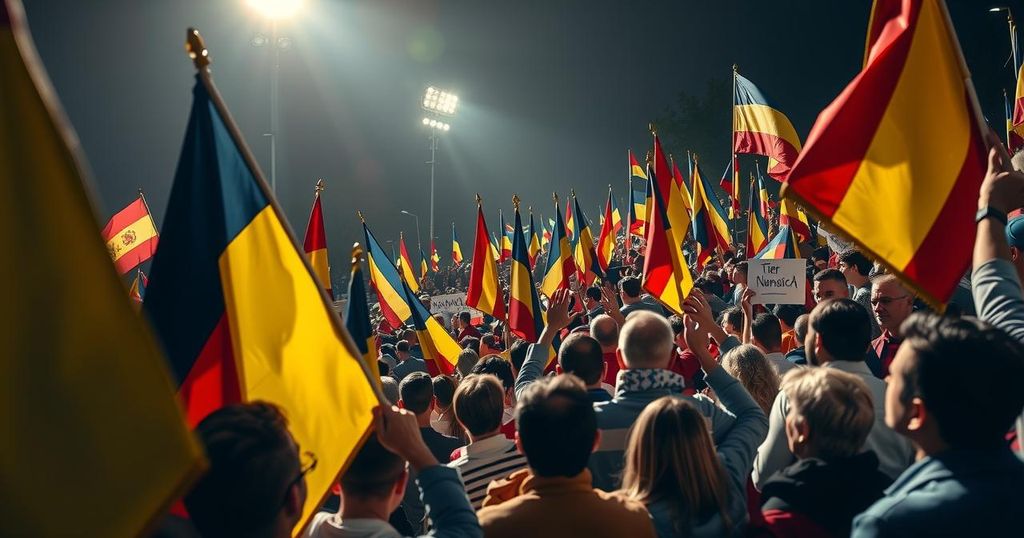Nationalist Sentiments Rise as Romania Approaches Presidential Elections

Romania’s political landscape is shifting as the country heads into elections marked by the rise of nationalist sentiments. President Klaus Iohannis’ passive leadership has led to a political vacuum, allowing Prime Minister Marcel Ciolacu of the PSD to lead in polling ahead of the elections. His main competitors, ultranationalist George Simion of AUR and progressive Elena Lasconi of USR, present starkly different visions for Romania’s future, signaling a potentially contentious electoral period ahead.
Romania has been notably absent from the European political discourse in recent years, despite its significant role within both the European Union and NATO. Occupying the sixth largest population rank among EU nations, Romania shares the longest border with Ukraine, marking its geographical and strategic importance. Uniquely threatened compared to its EU counterparts, Romania faces military provocations from Russian drones, prompting its government to take unusual measures such as constructing air raid shelters.
Yet, while countries like Poland and the Baltic states actively engage in discussions regarding Russia and Ukraine, Romania’s contribution has been minimal. This political silence is largely attributed to President Klaus Iohannis, whose decade-long tenure has seen a retreat from the proactive leadership initially promised. As Romania approaches a critical election period—starting with the presidential election on Sunday—his lack of assertive political presence has contributed to a growing nationalist sentiment within the country.
Prime Minister Marcel Ciolacu of the Social Democratic Party (PSD) emerges as the favored candidate in the upcoming elections, polling at around 24%. Historically, the PSD has been criticized for its ties to corruption and a right-wing populist stance while maintaining its dominance in rural areas. Despite its controversial reputation, many perceive Ciolacu as a stabilizing force capable of maintaining Romania’s position in the EU, albeit without significant anti-corruption reforms.
Contesting for the lead, George Simion of the ultranationalist Alliance for the Unity of Romanians (AUR) holds approximately 15% in the polls. Simion, seen as an anti-European figure, adopts strategies reminiscent of populist leaders globally and has faced scrutiny regarding alleged connections to Russian interests. Parallel to him is Elena Lasconi of the progressive Save Romania Union (USR), also polling at 15%. Lasconi attempts to navigate her party’s identity amid internal strife and social controversies.
Should the elections lead to a runoff on December 8, Ciolacu is likely to face Simion, in a scenario reminiscent of previous Romanian elections wherein voters may choose the lesser of two evils. Predictions for the parliamentary elections suggest a notable rise for populist and nationalist forces, with the PSD potentially securing substantial votes amidst rising AUR and USR support. Overall, worsening political polarization, characterized by the clash between traditional values and progressive reform, is expected to shape Romania’s electoral landscape in the weeks ahead.
As the sixth largest nation in the European Union by population, Romania’s strategic importance is amplified by its long border with Ukraine and its role as a base for US and NATO forces in southeastern Europe. Despite these factors, Romania has become increasingly disengaged from significant discussions about international security issues, particularly regarding its direct threats from Russia. The current political landscape is dominated by President Klaus Iohannis, whose lengthy and largely passive presidency has allowed nationalist sentiments to deepen amid general political disillusionment. As Romania prepares for critical elections, the dynamic between reformist and nationalist parties suggests an evolving and potentially contentious political environment.
The upcoming elections in Romania revolve around issues of nationalism and political reform, set against a backdrop of increasing threats from geopolitical adversaries. Prime Minister Marcel Ciolacu leads the presidential race while grappling with the legacy of corruption and political stability. Concurrently, ultranationalist George Simion poses a significant challenge, tapping into the sentiments of a disenchanted electorate. With growing polarization, these elections not only reflect domestic concerns but also Romania’s position within the broader context of European and international politics, ultimately marking a pivotal moment in the nation’s democratic evolution.
Original Source: www.dw.com








